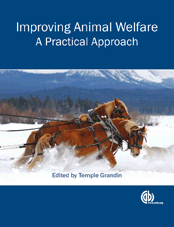 |
Improving Animal Welfare: A Practical ApproachEdited by Dr. Temple GrandinColorado State University, USA
ISBN: 978-1-84593-541-2
Subject Classifcation: KNAC, PSVP, TVH, TW
Links for ordering: |
 |
Improving Animal Welfare: A Practical ApproachEdited by Dr. Temple GrandinColorado State University, USA
ISBN: 978-1-84593-541-2
Subject Classifcation: KNAC, PSVP, TVH, TW
Links for ordering: |
This chapter discusses how economic factors can be influential in improving animal welfare and how economic factors can make animal welfare worse. Some of the economic factors that can bring about great improvement are welfare auditing programs by major meat buyers and holding producers and transporters economically accountable for death losses and bruises. Economic factors can make animal welfare worse when losses are passed on in highly segmented marketing chains or on a farm staffed with underpaid overworked employees.
Below is an excerpt from Chapter 11...
McDonald’s auditing programs are currently operating in the USA, Canada, South America, Australia, Asia and Europe. Large meat buyers such as McDonald’s and Tesco have brought about big welfare improvements by using their tremendous purchasing power to enforce standards. When a slaughter plant is removed from their approved supplier list, it may lose huge amounts of money. A single large US plant can lose over a million dollars if it is off the approved supplier list for a year. McDonald’s is such a large beef buyer that they purchase beef from 90% of the large or medium-sized US and Canadian plants. Socially responsible buying programs by big corporations have also brought about environmental and labor improvements. Pressure from activist groups forced the upper management of many big companies to exam in the substandard practices of their suppliers.
The author had the opportunity to take upper management people from many different companies on their first trips to farms and slaughter plants. When things were going well, they were happy and when they saw abuses, they became highly motivated to make improvements happen. The executives had to see bad practices with their own eyes to get them to make changes. One executive became really motivated to improve conditions after he saw an emaciated, sick, old dairy cow going into his hamburger. Animal welfare became real and was no longer an abstract concept that was delegated to the public relations or legal department. It is essential to get high-level executive out of the office so they can see bad practices to motivate them to change.
 Click here to return to the Homepage for more information on animal behavior, welfare, and care.
Click here to return to the Homepage for more information on animal behavior, welfare, and care.